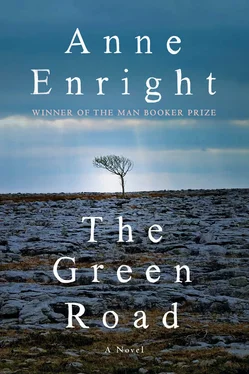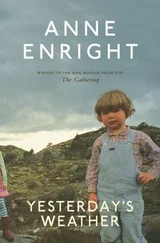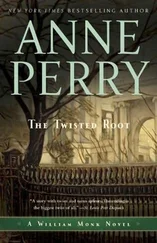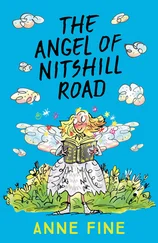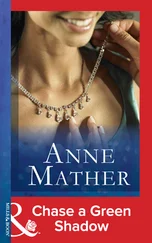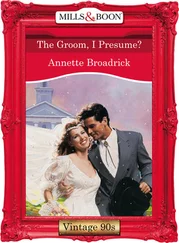‘What thingy?’ said Rory again.
‘Nothing. Everything’s fine.’
‘But you knew that, didn’t you?’ said Dessie. ‘That’s what the GP said.’
‘Did he?’
‘Yeah. He did. Remember, he said the way it moved around, that was the good thing. I mean, you’re a bit young.’
‘Am I?’ said Constance.
‘Well. That’s what he said.’
‘Oh, dear God,’ said Constance. ‘Oh dear Lord give me patience,’ and Rory slipped out of the room.
‘Honestly,’ she said. ‘No really. Fuck you! The lot of you.’
And they let her blow and stomp, they let her weep and rail, and stagger, weeping, off to the bedroom, after which Dessie went out and got fish and chips for dinner from the takeaway in town.
Later, Donal came in to read her his comic, and Rory lay behind her and stroked her hair. When they left, Dessie came in with a cup of tea and Constance said, ‘Did you save me some chips?’
‘Oh, sorry. Did you want any?’
‘Chips!?’
‘Did you want some? I can get some more.’
‘You’re all right,’ she said.
Dessie stood looking at her from the end of the bed.
‘There was a woman in front of me,’ she said. ‘And she had it.’
‘Right,’ he said, and showed willing by sitting on the edge of the mattress. But it was no use.
‘She was very big,’ said Constance. ‘I mean, big .’
‘She was probably on the medical card,’ said Dessie.
So Constance abandoned one version of her day, and told Dessie instead about the pain she had felt when she had looked at the woman’s scars, the feeling that shot down the length of her thighs. She did not know if other people felt this kind of thing; it was not something she had ever heard discussed. She said, ‘Do you ever get that? You know if you see something terrible, if one of the kids is hurt, or that time your man nearly lost the finger, with the knuckle sticking out of it — you remember? — and the whole thing dangling by a piece of skin.’
‘Run that by me again?’
‘Do you ever get that pain in your legs? Quite a sharp pain. Like, Oh no!’
‘Em. I get that, you know. That scrotum-tightening thing.’
‘Sympathy.’
‘Protection maybe. Like, hang on to your lad.’
‘Great,’ she said.
‘Or sympathy. Yeah. Maybe that’s what it is.’
And he kissed her.
‘Maybe,’ he said.
When she got up later, she hugged the boys and went to look for Shauna and found her outside, lying on the trampoline, looking at the stars. Constance clambered up there to join her, the pair of them in each other’s arms. Constance said sorry for shouting and Shauna said, ‘It’s not that. It’s not that.’ Then she had a little cry: some friend being mean to her, they could be very bitchy already, at eight and nine.
‘Never mind,’ said Constance. ‘Never mind.’
The cold webbing of the trampoline dipped and rose under them, Shauna’s hair flung back across it, fanned out by the static.
‘She’s just horrible,’ said Shauna. ‘She’s thinks she’s like the bee’s knees.’
The wind drifted up through the mesh and cooled them from below. They lay on the black expanse that rocked them lightly as they moved, and her daughter was comforted. Constance could do that much, at least. She could still do that much. And Constance was also comforted, lying on the trampoline under the stars, with her daughter in her arms.
THREE MONTHS AFTER Emmet moved in with her, Alice found a dog in the marketplace, or the dog found her and followed her home. It was a short-haired street dog with a dirty white pelt and a blunt face, and there was a dry, pink cyst growing from the corner of its left eye. She must have encouraged it. Emmet imagined her smiling over at the dog, then flinching when it turned to look at her. Or starting forward, her hands pressing into her cotton skirt as she crouched to talk to the dog; then reaching out to touch it, pulling back its ear to examine the bad eye.
Alice was drawn to suffering, which is why she lived near the marketplace and not on the edge of town. Emmet, too, was drawn to suffering — it was, after all, his job — and he was drawn to Alice. He did not ask why she had spoken to a dumb animal in a language that was foreign, even to the passers-by. It was her nature. And it was the dog’s nature to follow her, with one dog-brown eye more pathetic than the other.
It was the dry season and Emmet was often on the road, so he did not know how long it took him to notice the creature lying in the street outside the house, or to realise that it was always there when he opened the front gate. He seemed to forget the dog each time, and when he stepped around the stretched and panting thing it was with the sense of something he had left unsaid.
‘Stop by the dog,’ Emmet would say to his driver, meaning, ‘Don’t run over the dog.’ He assumed — if he ever gave the thing a thought — that the dog belonged to the street vendor on the corner, or that the vendor tolerated it: because street dogs don’t belong to anyone, they just desperately want to belong. So there it was — each time Emmet came back, dusty and hot, and hoping that Alice had sourced a decent Dutch beer. The dog lay on the ground like a dead dog, with its legs straight down, and its nose straight out, and only when you came close could you see the quick motion of its belly’s rise and fall. The creature did not belong in the heat, Emmet thought, any more than they did themselves: the flabby corners of its mouth pulsing pink inside black lips, the eyes squeezing painfully shut against the dust and — one of them — around the slowly expanding balloon of the cyst. Wincing, winking, squeezing tight. This difficulty gave the dog a salty air.
‘Eh, yeah,’ it seemed to say every time he passed. ‘Eh, yeah, I dunno about that.’
One day, Emmet kicked something on the way in through the gate. He looked down to see a china bowl with a pattern of roses, like something you might use back home. What was that doing there? He said it to Ibrahim, when the front door was opened.
‘What is the crockery doing in the street?’
Ibrahim never answered a direct question, and you had to respect that. Even so, there was a kind of yearning, in their talk, for the thing that could not be said.
‘Mister Emmet, sir?’
His eyes rested, liquid and compassionate, on Emmet’s passing sleeve.
‘The bowl outside the gate.’
Emmet dumped his bag on the hall table and turned to look, as the watchman ducked out and then back in through the gate under Ibrahim’s contemptuous eye. And there was something about this scene that kept Emmet in the doorway for a moment too long. It stayed with him as Alice came from the darkness of the living room to kiss him and recoil a little from the sweat. Something was wrong. He had seen this a hundred times before. The trick was not to ignore it. Or, when you dismissed something — and there was always something tugging at the corner of your eye — to notice your dismissal. You took note.
‘What’s the shouting for?’
‘What shouting?’
‘Ib.’
‘Is he?’
There were a couple of Tuaregs about the place. Emmet could never tell them apart, their faces were wound about with turbans of white cloth, but they were a proud people and handy in a fight, so he was surprised to see Ibrahim actually push the guy away from the front door to send him round the back of the house. Emmet had sensed it a hundred times before. Something was wrong.
‘Which one of them is that?’ he said.
But Alice just widened her eyes.
‘How are you anyway?’ he said. ‘Any beer?’
Most of the time it was nothing: the thing that was wrong. It was a clan thing or a sum of money, some mark of respect that had been denied.
Читать дальше
